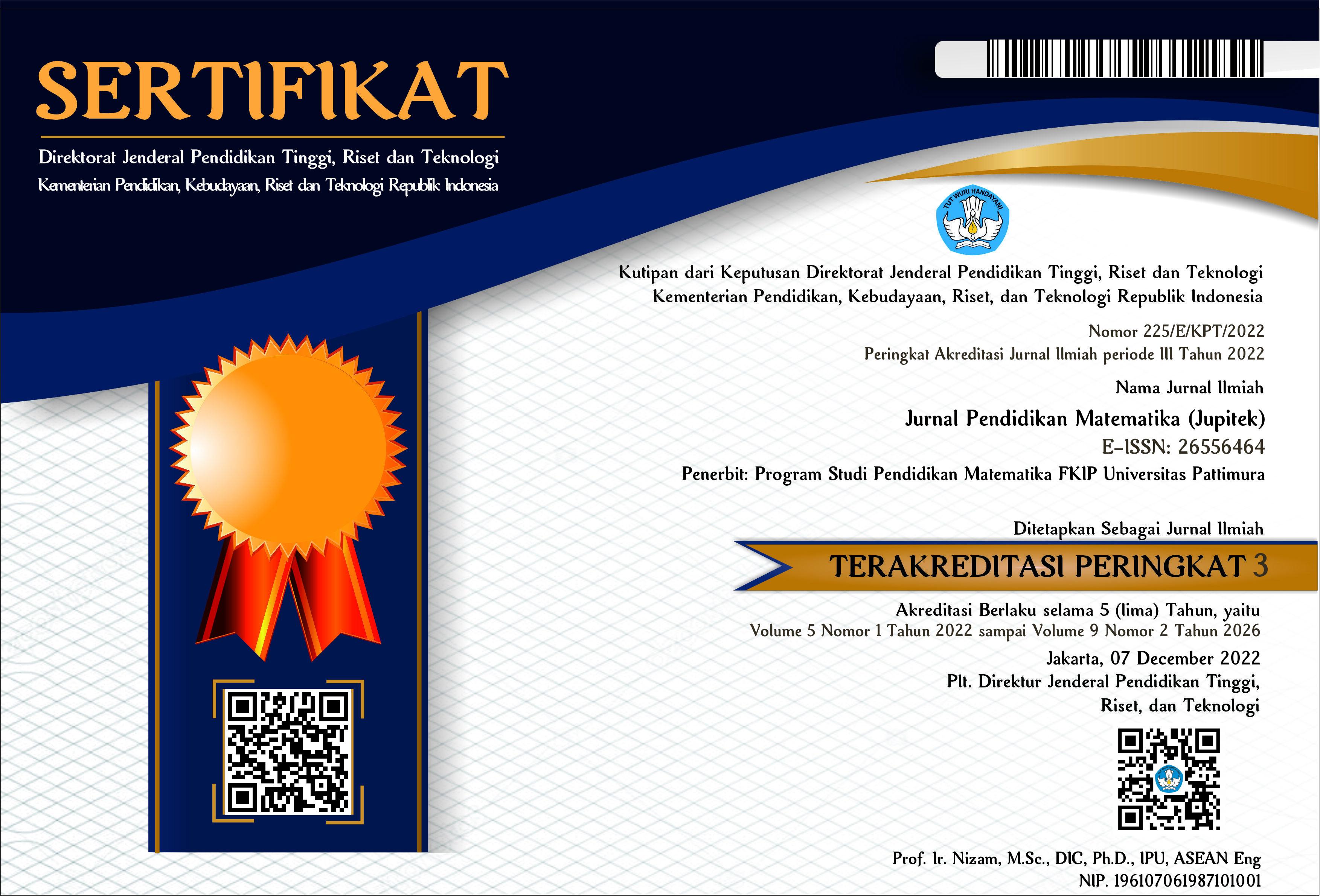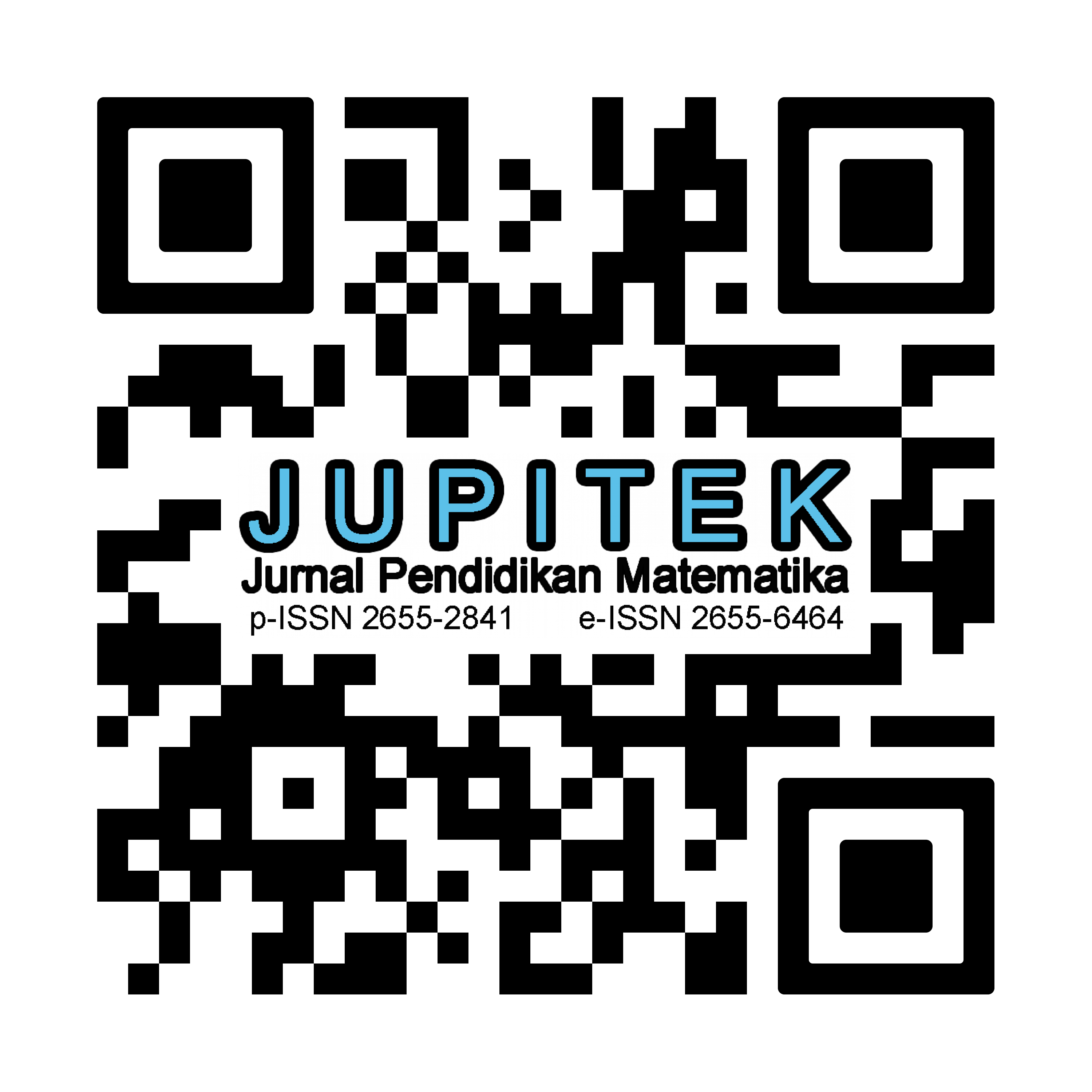PENERAPAN MODEL PEMBELAJARAN KOOPERATIF TIPE EXAMPLES NON EXAMPLES UNTUK MENINGKATKAN AKTIVITAS DAN KEMAMPUAN BERPIKIR KRITIS PESERTA DIDIK SMP NEGERI 3 BATANGHARI
Abstract
This study aims to determine the increase in learning activities and students' critical thinking abilities in circle material through the application of cooperative learning types Examples and Non Examples in Eight Grade Students of SMP Negeri 3 Batanghari. The research method is classroom action research which consists of four stages including: planning, implementation, observation, and reflection. The subjects of this study were students of class Eight Grade Students of SMP Negeri 3 Batanghari. Data collection uses instruments in the form of learning activity observation sheets and critical thinking ability test sheets consisting of 5 questions. The results of the study indicate the existence of: 1) Increased learning activities in the learning process. This can be seen from the increase in each indicator, the average percentage of learning activities per indicator, namely: a) focus of material presentation from teacher in the pre-survey is 78%. It decreases to 69.23% in the first cycle, then increasing to 82% in second cycle. b) Asking questions, in pre-survey at 9%, increased to 46.17% in first cycle, then increased to 62.8% in second cycle. c) Answering questions, in pre-survey by 4%, increasing to 42.33% in first cycle, and then increasing to 61.57% in second cycle. d) The activity in group discussions, in pre-survey by 57%, increasing to 55.1% in the first cycle, and then increasing to 65.37% in cycle II. e) Presenting group assignments, in pre-survey by 22%, increasing to 42.27% in first cycle, and then increasing to 62.8% in second cycle. 2) Increasing the percentage of learning outcomes of students' critical thinking skills from pre-survey by 30.33%, increasing to 30.76% in cycle I, and then increasing to 65.38% in cycle II. The conclusion of this study is that the application of the cooperative learning model type Examples Non Examples can: 1) Increase the learning activities of Eight Grades students of SMP Negeri 3 Batanghari 2018/2019 Academic Year. 2) Learning outcomes that refer to the critical thinking skills of Eight Grade Students of SMP Negeri 3 Batanghari ware improve.
Downloads
References
Aminoto, Tugiyo dan Pathoni, Hairul. 2014. Penerapan Media E-Learning Berbasis Schoology Untuk Meningkatkan Aktivitas dan Hasil Belajar Materi Usaha dan Energi Di Kelas XI SMA N 10 Kota Jambi. Jurnal Sainmatika, Vol 8 No 1 2014
Habibah, Syarifah. 2016. Penggunaan Model Pembelajaran Examples Non Examples Terhadap Ketuntasan Hasil Belajar Siswa Pada Materi Tokoh-Tokoh Pergerakan Nasional Kelas V Sdn 70 Banda Aceh. Jurnal Pesona Dasar, Vol. 3, No. 4, Oktober 2016.
Kusuma, Febrian Widya dan Aisya, Mimin Nir. 2012. Implementasi Model Pembelajaran Kooperatif Tipe Think Pair Share Untuk Meningkatkan Aktivitas Belajar Akutansi Siswa Kelas XI IPS 1 SMA Negeri 2 Wonosari. Jurnal Pendidikan Akutansi Indonesia, Vol. X No. 2 Tahun 2012.
Saleha, Wa Ode, dkk. 2016. Penerapan Model Pembelajaran Example Non Example Untuk Meningkatkan Aktivitas Dan Pemahaman Konsep Siswa Kelas Vii Smp Negeri 4 Parigi Pada Materi Klasifikasi Makhluk Hidup. Jurnal Ampibi, Volume 1, Nomor 1, Mei 2016.
Setiawan, Joko dan Royani. 2013. Kemampuan Berpikir Kritis siswa Dalam Pembelajaran Bangun Sisi Datar Dengan Metode Inkuiri. Edu-Mat, Volume 1, Nomor 1, Oktober 2013.
Syahbana, Ali. 2012. Pengembangan Perangkat Pembelajaran Berbasis Konstektual Untuk Mengukur Kemampuan Berpikir Kritis Matematis Siswa SMP. Edumatica, Volume 02 Nomor 02, Oktober 2012.
Wulandari, Fitri dan Leonard. 2015. Pengaruh Metode Pembelajaran Example Non Example Terhadap Hasil Belajar Matematika Siswa. Seminar Nasional Pendidikan Matematika. Universitas Indraprasta PGRI
Yanuarto, Wanda Nugroho. 2016. Example and Non-Example Pada Pembelajaran Matematika. Edumatica, Volume 06 Nomor 01 April 2016.
Copyright (c) 2019 Brigita Ivana Kurniati, H Jazim Ahmad, Dwi Rahmawati

This work is licensed under a Creative Commons Attribution-NonCommercial-ShareAlike 4.0 International License.
License and Copyright Agreement
By submitting a manuscript to Jurnal Pendidikan Matematika (JUPITEK), the author(s) certify and agree to the following terms:
- Originality and Authority: The submitting author is authorized by all co-authors to enter into this agreement. The manuscript describes original work that has not been published previously in a peer-reviewed journal, nor is it under consideration for publication elsewhere.
- Approval: Its publication has been approved by all author(s) and by the responsible authorities of the institutions where the work was carried out.
- Rights: The authors secure the right to reproduce any material that has already been published or copyrighted elsewhere.
- Licensing and Copyright: Authors retain the copyright to their work.
- License Grant: The authors grant Jurnal Pendidikan Matematika (JUPITEK) the right of first publication, with the work simultaneously licensed under the Creative Commons Attribution-NonCommercial-ShareAlike 4.0 International (CC BY-NC-SA 4.0).
- Self-Archiving: Authors are permitted and encouraged to deposit the published version of their article in institutional repositories, on their personal websites, and other academic platforms, with proper acknowledgment of its initial publication in Jurnal Pendidikan Matematika (JUPITEK).






.png)


